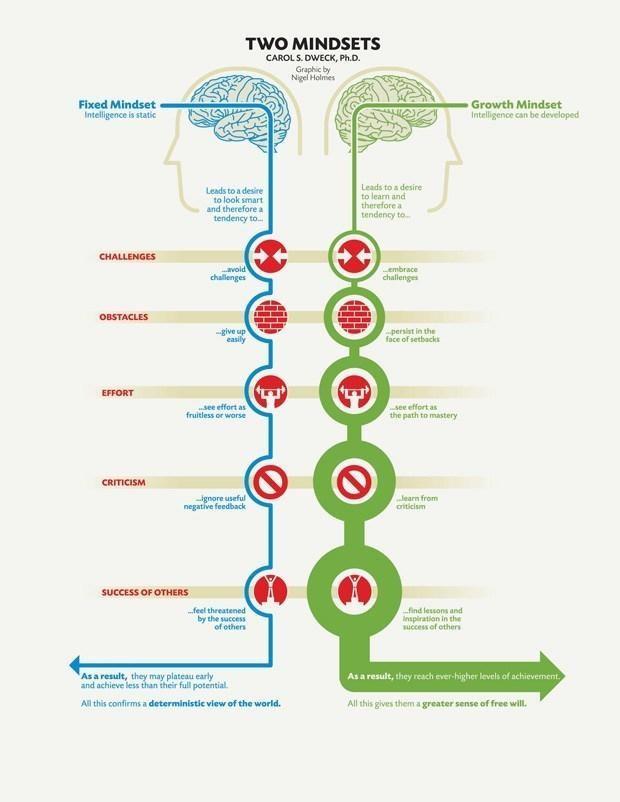
The Basics of a Fixed vs. Growth Mindset
Being a leader takes time and effort.
There’s no doubt that our society reveres leadership, with people toiling and striving their entire lives toward that perpetual glass ceiling.
And while blunders and doubt are only natural given the extreme pressures of the job, they don’t circumvent the heavy responsibility and sense of duty to your career as the clock races on.
The stress and pressure of the competitive race to the top can be all-consuming, and quite often, managers get to a point where they must stop and ask themselves: Why am I doing this?
Quite frankly, it’s a struggle to avoid burnout, given the lonely climb to the top. Colleagues become subordinates, and professional loyalty trumps personal relationships.
This struggle is where mental health becomes incredibly vital.
As a leader, you toil away, burning the midnight oil, with the world’s pressures squarely on your shoulders. There’s little room for emotions like sensitivity and doubt.
To be successful, you must be solid and sure in yourself, and that conviction will inspire the same from all you encounter.
Outstanding leadership comes from a deep confidence in oneself, first and foremost.
So how do today’s professionals, with all the modern demands and technologies, attain success without losing sight of one’s self?
It’s more of a mental game than people think.
World-renowned Stanford psychologist Carol S. Dweck said it best:
“For twenty years, my research has shown that the view you adopt for yourself profoundly affects the way you lead your life.”
Dweck pioneered the theory of a fixed versus growth mindset, developed after decades of research and studies.
A fixed mindset considers people incapable of change and growth. It subscribes to the theory that we as people are static: our character, intelligence, and creative ability are all set in stone at birth and cannot be changed. Success only serves as a measuring stick of born intelligence.
It represents a more passive approach to life, which relies heavily on your inherent qualities while requiring little to no effort to improve them. You are who you are, and your capabilities only extend so far.
This approach is perilous because when you feel you’re only capable of so much, you do not strive for better. You’re not open to new opportunities or to try new things. It can also establish a deep, inherent fear of failure because you believe you are incapable.
Dweck continues, “Believing that your qualities are carved in stone — the fixed mindset — creates an urgency to prove yourself over and over. “
Successful leaders need to find a way to afford to subscribe to a fixed mindset.
Instead, today’s professional is intensely devout to a different growth mindset.
A growth mindset is motivated by challenge, seeing failure simply as a stepping stone to greatness. They see the stars and reach for them, believing that the impossible is possible and that with their hard work and dedication, they can also contact the stars.
Failure is only an avenue for growth, a welcome challenge to improve and be better.
A growth mindset also means that emotions such as love and compassion grow through life experiences and hard work. Intelligence and creativity are attainable if you are willing to work for them.
It’s a process of retraining your brain to think positively and giving the strategy its deserved patience and time.
As you are aware, success nor growth occurs overnight.
How to adopt a more growth-oriented mindset in both your life and your career:
- Be open to failure. You’re already one step ahead of the game by identifying your weaknesses. Now you have a starting point and a stepping stone to growth.
- See opportunity instead of a challenge. Adopt a positive mindset that envisions success and leads you straight to it. If you leave your comfort zone, you will find a new world open to you.
- Take the time to understand and learn rather than just cramming dates, names, and details into your brain. Half the reward lies within the process.
- Constructive criticism is vital! You will make mistakes, but that should not be perceived as failure. Half the experience is within the journey, so it’s time to try a different approach.
- Work with Taylor White Consulting to explore your learning style. Some people perform best in a social setting, while others may require physical, visual, or even aural stimulation. We at Taylor White Consulting can help.
You encounter new situations, interactions, relationships, and environments every minute of every day. And each minute of the day, life allows you to refresh, an opportunity to change and alter the landscape of your thought process.
Don’t allow your failures, or even a single moment of your life, to define you.
You are a blank slate, a canvas that is forever rewritten, repainted, and improved throughout the years. Don’t stay stagnant. Be proactive.
Take control of your life and, in doing so, your destiny.





